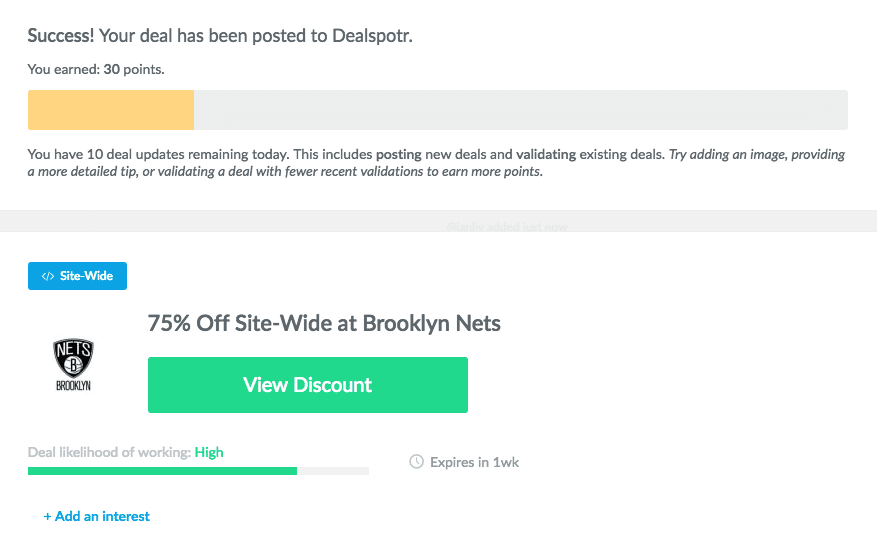 A big part of what we do on this site is intended to help save people money on travel. A smaller part is dedicated to saving up for travel, through tools and tricks that can expand a travel budget.
A big part of what we do on this site is intended to help save people money on travel. A smaller part is dedicated to saving up for travel, through tools and tricks that can expand a travel budget.
Dealspotr (sign up with my referral link to start with $5 in your account) falls into the second category. It’s not travel-focused, specifically, but it’s quickly becoming a formidable ally of all with an interest in saving money. It’s not even two-years old (it launched in 2015), and already it’s arguably the best and most efficient place to go looking for online shopping deals—when buying clothes, furniture, travel gear, event tickets, and whatever else.
Finding deals with Dealspotr
When you buy something online, you’ll almost always have the chance to enter a promo or coupon code at checkout. If you’re like me, you’ve probably tried Googling for coupon codes to use before purchasing shoes or something. Sites like RetailMeNot and Coupons.com aggregate codes to try, and sometimes they work. But none of them is perfect.
Dealspotr’s mission is to simplify and consolidate the hunt for coupon codes on an all-in-one “Google for deals.” In at least this study, Dealspotr’s catalog of codes exceeds what’s offered by the competition in quantity and accuracy. Deals and coupon codes are crowd-sourced by people like you and me, who can earn points, status and gift cards adding and verifying codes. Thus is upkeep incentivized. Expired codes are taken down, new deals are added and the Dealspotr tool keeps getting better as all parties (deal-sharers and deal-finders) fill their pockets.
And so using Dealspotr is simple. You sign up (use my referral link!), build a quick profile, and then search for deals. It’s easy…
…at least on paper. I’m currently in the market for some grey low-top shoes, and I so took that search to Dealspotr to try it out. Here’s what I liked:
- Inventory — There are a ton of codes, all of which have demanded diligence/time from the users who posted them. In reference to this study (again), Dealspotr has more deals—and effective deals—than competing sites and tools. That’s hard to measure in one search for shoe savings, but I can say that I found a lot of options for shoes. The screenshot below shows the top six results on the first of 28 pages.

- Accuracy — As already mentioned, deals and coupon codes are curated by real people, who have real, spendable reasons to keep the site robust and effective. That makes a world of difference. Here’s a little more on why Dealspotr’s codes are more reliably effective than some of the others out there. Key to Dealspotr’s efficacy is the “validation” tool, with which users do a remarkable job policing posted deals. This is in fact the largest wellspring of user points (which past stated benchmarks become gift cards or PayPal money). See a deal that’s expired? A bad link? For points, you can mark a deal as incorrect, edit its info (if it’s incorrect) and invalidate it entirely if it’s not working. Here’s more on how validation works.
- Search filters — You can search by website/marketplace, yes. But you can also see results filtered by store category (like “Fashion,” further distilled into “Shoes”), interest, quantity of deals, how recently codes have worked, and more. That said, the search function was not quite as clean as I’d hoped it would be (starting a new search from a page of results was not easy, and the deluge of tangentially relevant results was sometimes overwhelming). On the other hand, my search for shoes needs narrowing right now, and I am open to letting a good deal lead the way. Unexpectedly, the yields of a few of my searches included more than one new online outlet through which I can look for shoes (with coupon codes or not).
- Screenshots verifying that codes work — A new feature in the deal-finding space. When a posting a deal, users must attach a screenshot offering some kind of proof. Seeing a code deliver real savings in a real person’s shopping cart is reassuring, and saves time.
- A marketplace for referral codes — Many companies offer users referral codes (think Lyft, for example), with which new users can earn savings and referrers can earn money. I’ve always thought there should be a place to share your own referral codes and to access codes provided by people you don’t know. Why let your social circle limit your savings? If such a marketplace exists elsewhere, I have not come across it. On Dealspotr, the gains of referral codes are available to all.

- A tool that measures how likely a deal is to work — Seen above. This practice exists elsewhere, but Dealspotr has fine-tuned it. Unlike RetailMeNot, which displays the results of an optional “worked/didn’t work” poll, the site computes each code’s or deal’s likely availability (like simply “High”) based on factors like posting date and feedback, which it measures as seen above.
- Customized deal curation — People remain people on Dealspotr, in that you can identify and keep up with the postings of users whose deals or interests resonate with you. You can also subscribe to receive deals pertaining a growing list of interests.
- Checklists that keep you active — An evolving checklist, visible at the top of the site when you’re logged in, offers you ways to earn points. Add a profile pic, earn points. Post your first deal, earn points. Every day your checklist will refresh, and every day you’ll get 200 bonus points if you complete it. This is the last item on this list for a reason, but it is no doubt a clever feature that’s good for user momentum.
Sharing deals with Dealspotr
The same incentives that make finding coupon codes and deals easy on Dealspotr make sharing deals worthwhile, as well. I will never be the type to share shopping deals with strangers on a daily basis, but with my Dealspotr account, posting a deal—even one—can make me money.
For example: I just recently bought some Brooklyn Nets apparel, which in the wake of the team’s 20-win season is available for 75% off in its online shop. Those are big savings, and I’ve wanted to share the news (and fill my friends’ closets with Nets jerseys) since buying two items earlier this month. With that in mind, I went to work.
I posted the deal, which is currently site-wide, via a few intuitive, though not exactly short, steps. For this, I received 30 points—an amount not unrelated to my inexperience sharing deals. As I post more deals that are confirmed as accurate by other users, my accuracy score (indicated in the green box on the upper-right) will increase, and so will the points I earn per deal.

The model is relatively simple: The more you put into Dealspotr, the more you—and everyone else—will get out of it. So far, the “Google for deals” has saved deal-finders more than $20 million since the site launched in 2015. It may save me money on some size-12 summer shoes, and earn me a gift card for being an unshakeable Nets fan.
If nothing else, it’s an impressive resource for anyone looking to save money. Check it out, and let me know what you think in the comments below.
This is a sponsored post. All opinions expressed are the author’s own.







